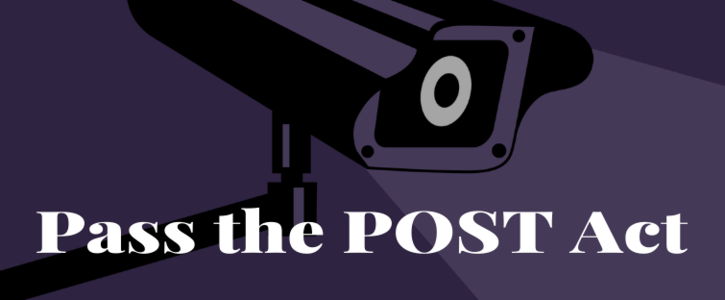500 signatures reached
To: New York City Council Speaker Corey Johnson
Reform NYPD Spying - Pass The POST Act

Speaker Johnson,
We, the people of New York City, urge you to rein in NYPD spying and support passage of The Public Oversight of Surveillance Technology (“POST”) Act. As the leader of the Council, you’ve constantly acted as a champion for communities in need. We urge you to do so once again and ensure the POST Act is enacted this year by calling for a vote.
We, the people of New York City, urge you to rein in NYPD spying and support passage of The Public Oversight of Surveillance Technology (“POST”) Act. As the leader of the Council, you’ve constantly acted as a champion for communities in need. We urge you to do so once again and ensure the POST Act is enacted this year by calling for a vote.
Why is this important?
The POST Act addresses the long-unmet need for civilian oversight of NYPD surveillance practices, particularly the acquisition and deployment of novel, highly-invasive technologies. For years, the NYPD has built up an arsenal of spy tools on the public tab while trying to block public notice and debate. These tools not only include the so-called “gang database,”[1] but also items like facial recognition, IMSI catchers (so-called “stingrays”), and automated license plate readers that can monitor a vehicle’s location throughout the city.[2]
These tools threaten all New Yorkers' privacy, but they pose a particularly potent threat to our immigrant communities and New Yorkers of color. Unchecked, the growing use of surveillance technology threatens to obscure and automate racial inequalities under the guise of unbiased computer systems. And too often, these systems create a risk of information sharing with federal agencies, including Immigrations and Customs Enforcement (“ICE”).
For example, the NYPD has contracted for years with the private firm Vigilant Solutions, which operates a national database of over 5 billion license plate data points. Shockingly, in recent years, we learned that Vigilant Solutions was not just contracting with local police departments, it was also contracting with ICE. This is the vendor that the NYPD uses to record countless New Yorkers’ license plates per day, and we do not have an accurate understanding of how the NYPD may be sharing license plate data with ICE.
Even worse, the NYPD relies on Vigilant Solutions’ artificial intelligence to map out social networks, label New Yorkers as “criminal associates,” and create databases based on the company’s unproven algorithms. This is just one example of countless surveillance tools that requires a systematic solution.
The POST Act is not just a comprehensive response, but also a modest one. The NYPD can continue using these tools by complying with limited protections against waste, discrimination, and misuse. In fact, the POST Act would be one of the most limited surveillance reform bills in the country, especially when viewed in comparison to San Francisco’s and Oakland’s oversight legislation, which also contain outright bans on facial recognition technology or to Massachusetts’s proposed state-wide moratorium on facial recognition. Additionally, many of the jurisdictions require legislators to approve each and every surveillance system their municipality buys, unlike the POST Act, which only requires public notice.
The measure is not just widely supported by your City Council colleagues, it’s even endorsed by the New York Times.[3] The message is clear: civilian oversight of surveillance enhances the public’s trust in police departments and public safety. After a hearing before the Public Safety Committee in December, thirty-two City Council members and the Public Advocate have now signed on as POST Act cosponsors. The time is now for a vote of the full City Council.
[1] https://www.stopspying.org/latest-news/2019/7/23/the-nypds-gang-database-a-new-age-of-stop-and-frisk
[2] https://www.stopspying.org/latest-news/2019/9/26/domain-awareness-system
[3] https://www.nytimes.com/2019/05/18/opinion/nypd-post-act-surveillance.html
These tools threaten all New Yorkers' privacy, but they pose a particularly potent threat to our immigrant communities and New Yorkers of color. Unchecked, the growing use of surveillance technology threatens to obscure and automate racial inequalities under the guise of unbiased computer systems. And too often, these systems create a risk of information sharing with federal agencies, including Immigrations and Customs Enforcement (“ICE”).
For example, the NYPD has contracted for years with the private firm Vigilant Solutions, which operates a national database of over 5 billion license plate data points. Shockingly, in recent years, we learned that Vigilant Solutions was not just contracting with local police departments, it was also contracting with ICE. This is the vendor that the NYPD uses to record countless New Yorkers’ license plates per day, and we do not have an accurate understanding of how the NYPD may be sharing license plate data with ICE.
Even worse, the NYPD relies on Vigilant Solutions’ artificial intelligence to map out social networks, label New Yorkers as “criminal associates,” and create databases based on the company’s unproven algorithms. This is just one example of countless surveillance tools that requires a systematic solution.
The POST Act is not just a comprehensive response, but also a modest one. The NYPD can continue using these tools by complying with limited protections against waste, discrimination, and misuse. In fact, the POST Act would be one of the most limited surveillance reform bills in the country, especially when viewed in comparison to San Francisco’s and Oakland’s oversight legislation, which also contain outright bans on facial recognition technology or to Massachusetts’s proposed state-wide moratorium on facial recognition. Additionally, many of the jurisdictions require legislators to approve each and every surveillance system their municipality buys, unlike the POST Act, which only requires public notice.
The measure is not just widely supported by your City Council colleagues, it’s even endorsed by the New York Times.[3] The message is clear: civilian oversight of surveillance enhances the public’s trust in police departments and public safety. After a hearing before the Public Safety Committee in December, thirty-two City Council members and the Public Advocate have now signed on as POST Act cosponsors. The time is now for a vote of the full City Council.
[1] https://www.stopspying.org/latest-news/2019/7/23/the-nypds-gang-database-a-new-age-of-stop-and-frisk
[2] https://www.stopspying.org/latest-news/2019/9/26/domain-awareness-system
[3] https://www.nytimes.com/2019/05/18/opinion/nypd-post-act-surveillance.html

